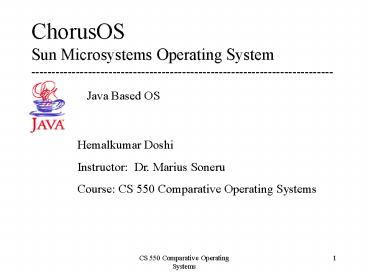ChorusOS Sun Microsystems Operating System -------------------------------------------------------------------------- - PowerPoint PPT Presentation
1 / 18
Title:
ChorusOS Sun Microsystems Operating System --------------------------------------------------------------------------
Description:
How Chorus is Used in a Distributed System. Features and Benefits of ChorusOS ... Messages: A Chorus message consists of a variable length body (limited to 64 ... – PowerPoint PPT presentation
Number of Views:443
Avg rating:3.0/5.0
Title: ChorusOS Sun Microsystems Operating System --------------------------------------------------------------------------
1
ChorusOSSun Microsystems Operating
System-------------------------------------------
-------------------------------
- Java Based OS
Hemalkumar Doshi Instructor Dr. Marius Soneru
Course CS 550 Comparative Operating Systems
2
Overview-----------------------------------------
---------------------------------
- History of the ChorusOS
- Goals of ChorusOS
- ChorusOS Abstraction
- ChorusOS Operating System Kernel
- Product Components
- ChorusOS Layers
- How Chorus is Used in a Distributed System
- Features and Benefits of ChorusOS
- Chorus Application Overview
- Conclusion
3
History of the ChorusOS--------------------------
------------------------------------------------
- Originally developed as French research project
- Bought by Sun Microsystems in 1997
- V0 collection of actors
- V1 French SM90 Multiprocessor Ethernet
- V2 Move to Micro-kernel
- V3 Sun bought RPC implemented
4
Goals of Chorus----------------------------------
----------------------------------------
- Enhancement of Unix
- Dynamically Loadable Servers
- Real Time Operations
- Improve network communication
- Portability
5
ChorusOS Abstraction-----------------------------
---------------------------------------------
- Actor is an execution environment.It can have
one or more thread - Ports is an unidirectional communication channel
with an associated message queue. Ports can be
migrated between actors. - Port groups Ports can be made members of port
groups. A port group is a destination for
messages, and there are several addressing modes
for sending messages to a port group. - Messages A Chorus message consists of a variable
length body (limited to 64 kilobytes), and
optionally a fixed-size (64-byte) header. - Regions, segments and local caches An actors
address space is divided into regions. A region
can be mapped onto a portion of a Segment. For
each mapped segment the kernel keeps a local
cache.
6
ChorusOS Operating System Kernel----------------
--------------------------------------------------
--------
7
Product Components-------------------------------
-------------------------------------------
- Core Executive
- Support for Multiple Independent Applications.
- Support for user and system applications
- Support for applications in user and supervisor
address space - Dynamic Memory Management
8
Product Components Cont-------------------------
-------------------------------------------------
- Schedulers
- Real-time scheduler
- Priority-based, pre-emptive FIFO
- Multi-class scheduler
- Priority-based, pre-emptive FIFO
- Priority-based with fixed-time quantum
- User defined policy
9
Product Components Cont-------------------------
-------------------------------------------------
- Communications
- Local IPC Single-board, asynchronous,
synchronous, and multicast communication - Distributed IPC Location-transparent extension
to multiple IPC communication sites - Real-time message queues
- Shared memory
10
Product Components Cont-------------------------
-------------------------------------------------
- Memory Management
- Flat memory Management of physical memory, no
protection - Protected memory Multiple protected address
spaces - Virtual memory Page-based protected address
spaces, optional on-demand paging
11
Product Components Cont
- Synchronization
- Semaphores
- Mutexes
- Event flags
12
Product Components Cont
- Time Services
- Timers One-shot or periodic, usable from both
supervisor and user-mode applications - Time of day Universal time
- Real Time Clock (RTC)
13
ChorusOS Layers----------------------------------
----------------------------------------
UNIX Subsystem
Object-Oriented subsystem
User process
U3
U2
U1
User Address Space
System process
S1
S2
S3
Management of names, processes, threads,
memory, and communication
K1
K2
Kernel Address Space
Micro-kernel
14
How Chorus is Used in a Distributed
System-------------------------------------------
-------------------------------
- Three layer communication
- User interface to system
- System interface to kernel
- Kernel interface to micro-kernel
- Uses message passing between process and threads
15
Features and Benefits of ChorusOS----------------
--------------------------------------------------
--------
- Memory Protection
- Hot Restart
- Dynamic Reconfiguration
16
Features and Benefits of ChorusOS
Cont--------------------------------------------
------------------------------
- Component-based architecture for
super-configurability - Mission-Critical Quality
- Exceptional scalability
- Transparent Distribution
- Code re-use
- Multiple OS personalities and APIs
17
ChorusOS Application Overview--------------------
--------------------------------------------------
----
- Wireless Networks
- Private and Public Switches (PBXs)
- Datacom Systems
- Internetworking Equipment
- Transmission Equipment
- Line Cards
- Cellular Networks
- Network Monitoring Equipment
- Satellite Transmission Systems
18
Conclusion---------------------------------------
-----------------------------------
- Micro-kernel based system used in distributed
operating systems - Provides binary compatibility with UNIX
- Consist of three layers
- Kernel contains micro-kernel
- Subsystems support for user programs
- User processes at top layer

